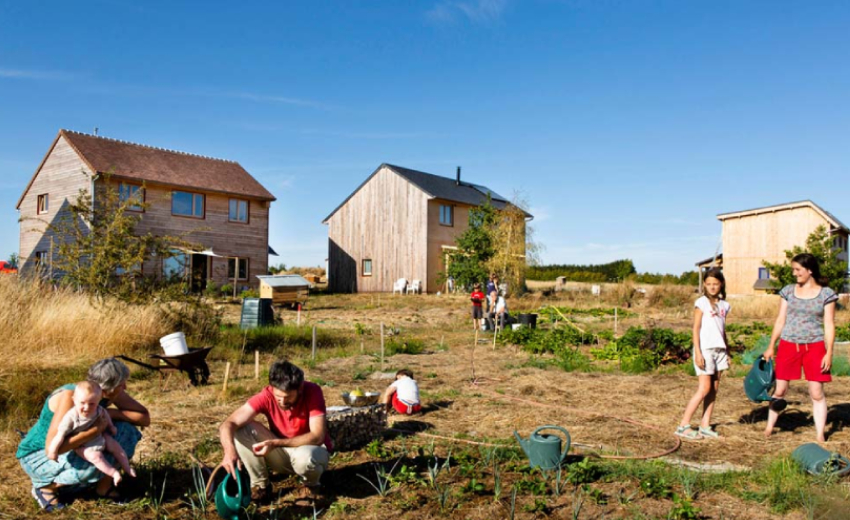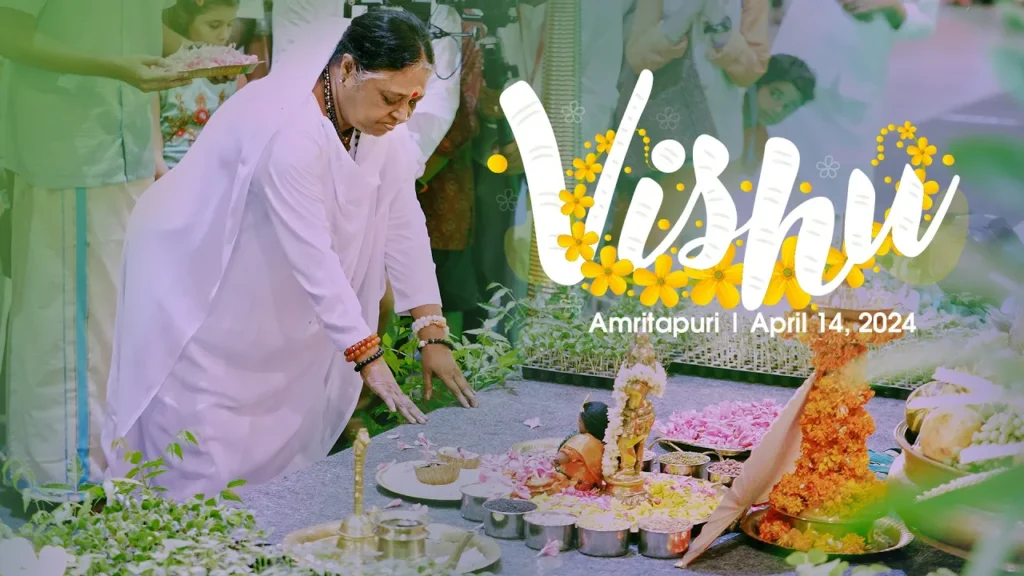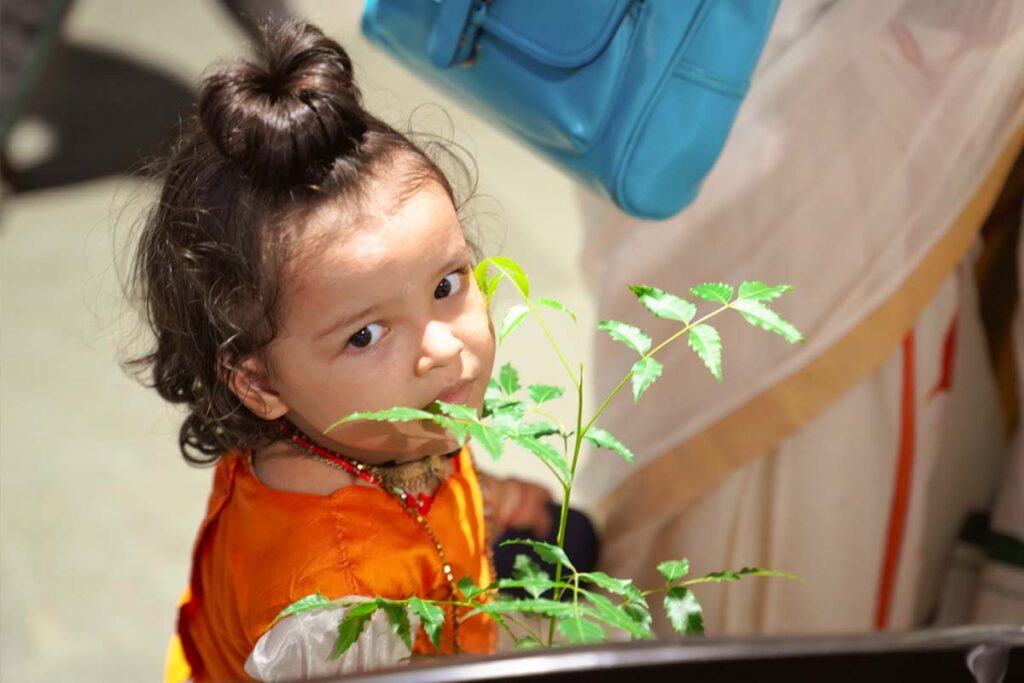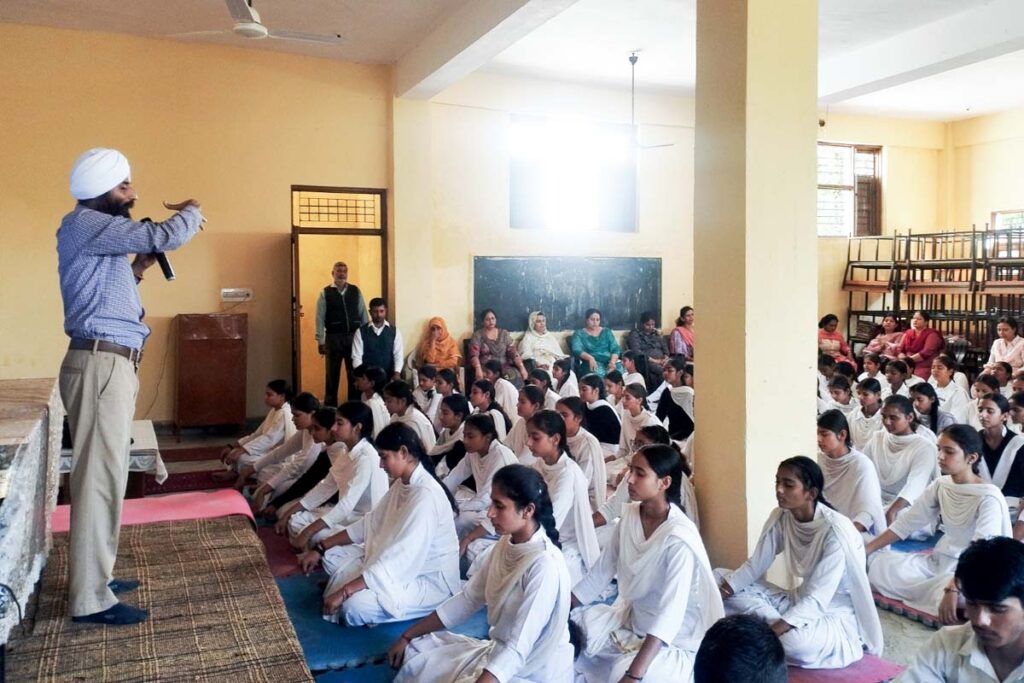At the Amma Center in Pontgouin, France, members are developing an ecovillage on a neighboring property. Their goal is to live nearby to support the center and its humanitarian activities, alongside a vision to create a community that embodies an ecological, supportive and respectful way of life for all.
Mathieu Labonne is the coordinator of the center, La Ferme du Plessis, as well as one of the people building the ecovillage. He shares how the experience began, where it is today and the outlook for its future.
Our vision
This ecovillage is a way for us to fulfill our dreams to achieve a sustainable way of living and a supportive neighborhood. Through the pooling of resources, we can be more self-reliant in terms of food and energy. I believe that the key to creating sustainable lifestyles is in community living. To be self-reliant alone is not possible, but we can share our skills, goods and time to produce some of our food, build our homes and organize cultural activities.
Swamini Amritajyoti Prana is President of ETW-France and Director of the Amma Center in Pontgouin. She says, “We are so lucky to have had this land for sale, just next to the ashram. Some of you wanted to come and serve in the ashram, yet still have your own homes. The beauty is that the ecovillage is creating a balance between your private life, volunteer activities and spiritual practices.”
Her words gave us the encouragement and support we needed. The ecovillage’s first purpose is to give members the means to live nearby, which makes it much easier to run the center. This builds a resilience, as when someone is not around, another person can do a little more to ensure maintenance and support on all levels.
Our family’s house is built exclusively with natural materials and so well insulated, we only use two cubic meters of wood to heat 140 square meters. We have three children, and it is helpful as a parent to have them growing up in a community with lots of friends and adults they can trust. In terms of the experience of nature, the children grow up with an awareness of environmental conservation, alongside having a wonderful place to play in the four-hectare garden.
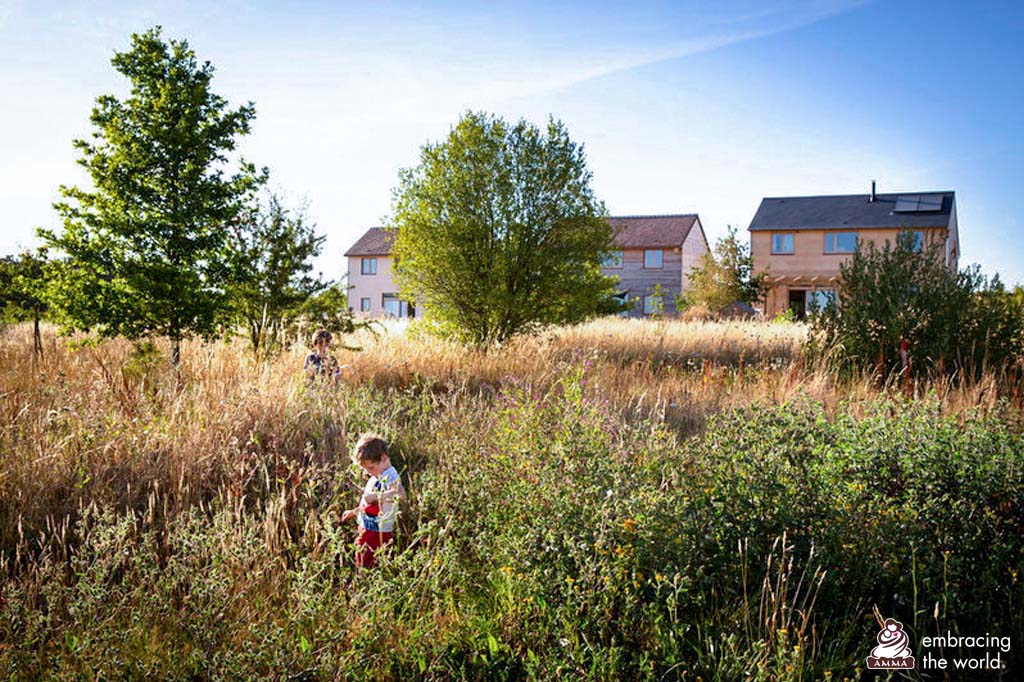
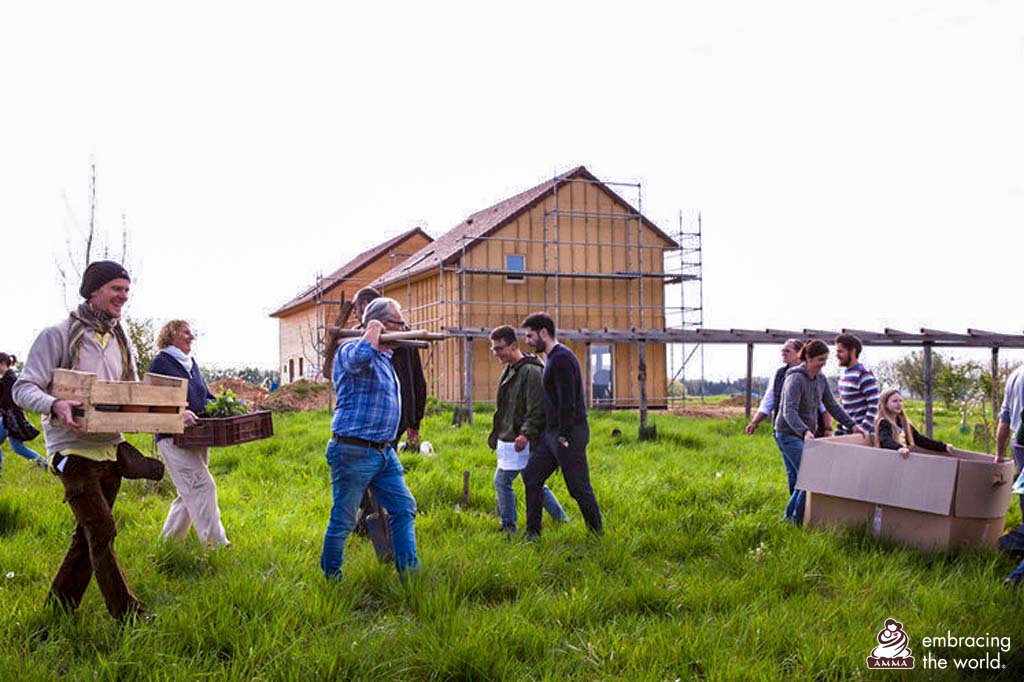
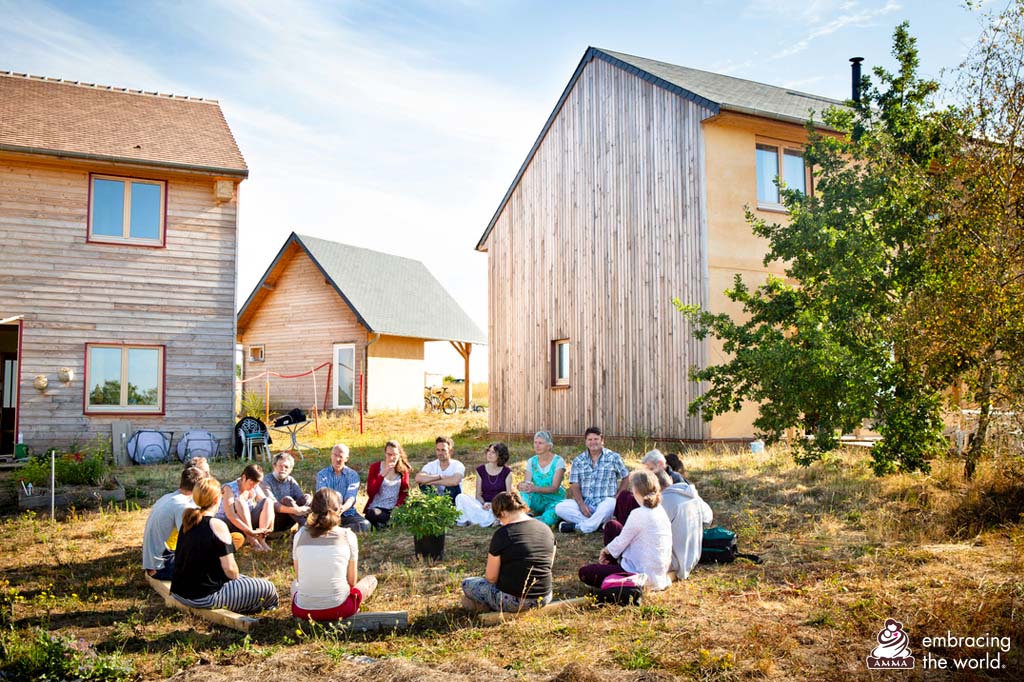
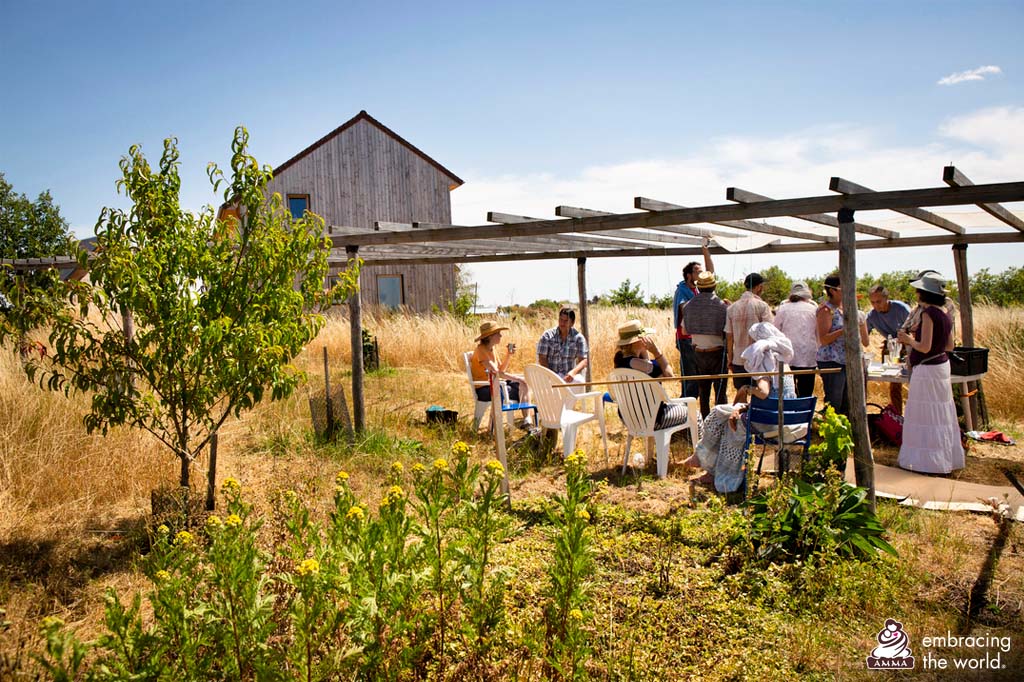
How the project began
Since the Amma Centre first opened in Pontgouin in 2002, people have come to live nearby to participate in running the centre. Many of these “neighbors” have shared their hopes for a way of life that’s aligned with the values they hold dear, including ecology, pooling resources and mutual support. Some of them have been deeply involved in developing the Ferme du Plessis gardens and in transforming this place into an educational ecosite using permaculture techniques.
In 2014, a pioneer group of about ten people started to think about founding an ecovillage, and in 2017, purchased a 4-hectare plot of land that is just 150 meters from the Amma Centre. The inhabitants of the ecovillage want to embody an ecological, supportive and respectful way of life by achieving a balance between privacy and individual sovereignty on one hand, and a collective life that facilitates sharing and social ties on the other.
The project is supported by a special type of association, which manages the common assets. Each household owns a small private plot of land, subject to building regulations that lay down collective choices: compulsory dry toilets, bio-sourced materials, respect for local architecture, heat insulation requirements and other such details.
These choices ensure high ecological quality while leaving each person responsible for the work done on his or her house. There is individual choice in terms of how to build one’s home, including the option to self-build, alongside the community association which manages the construction and maintenance of common areas.
The collective and governance
The project spans 28 units surrounded by large communal areas, and 27 are already purchased. The profiles of the participants are diverse and reflect a desire for generational diversity. An inclusion process allows the project members to choose their future neighbors.
For many years, there are plenary meetings once every three months, which has built trust between members. Official residents of the Amma Center also attend. This joint commitment is essential to guarantee an efficient and relatively light governance for an ecovillage of this size. Part of the strength of the collective is thanks to common roots in Amma’s teachings on how to live as an individual who supports a larger community, as well as our natural world.
Today, the ecovillage is administered by a steering committee of seven people elected on the “no-candidate” principle, also known as “elections by consent”. It is a method originally from the sociocratic process where the community offers roles to people they feel are best suited instead of candidates individually deciding to run. Once selected, the individual decides whether to take on the responsibilities or not.
At the next level, clusters of five to eight people manage different aspects of the ecovillage: gardens, works, communications, and so on. We are gradually building governance with the intention of being both efficient and participatory, and decisions are generally taken by consent.
The ecological dimension
One of the facets that brought the inhabitants of the ecovillage together is strong ecological motivation with the search for autonomy, above all regarding food, but also energy and water. The building regulations ensure that the houses are made of bio-sourced materials, almost entirely passive, heated without fossil fuels, with dry toilets and solar hot water. Each house finds its own solutions to abide by these constraints and the project constitutes a true eco-construction lab.
The collective has chosen an ecological sanitation system featuring three plant purification systems, and under this process, grey water is recycled back into the natural water cycle. The overall design of the water management system includes valleys, ponds and basins, since the local climate is wet in winter but very dry in summer.
The general layout of the 4.3 hectares has been designed on a permaculture basis to facilitate its maintenance in the long term. More than 100 large trees and a food forest have already been planted. This allows for the progressive production of part of the inhabitants’ food, with collective vegetable gardens close to their houses.
Finally, sharing communal buildings helps to reduce the ecological footprint of the inhabitants. Collective laundry rooms and guest rooms in the future large communal buildings will make it possible to build smaller houses that will not need their own washing machines and can have fewer rooms.
A gateway to a more just world
The ecovillage is still in the construction phase, with 11 houses inhabited or under construction out of its 28. The first family moved in at the end of June 2019 and building will continue until at least 2024. However, the project is already attracting a lot of visitors to our monthly guided tours. In France, more and more people are dreaming of creating this kind of living, and the project is an active member of Oasis, a large network of ecovillages and eco-communities in the country.
Nonetheless, it’s rare to see such large ecovillages in France, as most are inhabited by fewer than 15 families. The ability to succeed with such a large project is especially due to the ideals that unite us. Without Amma’s teachings and people’s love for her, the project could never have been set up so easily and yet be so large. This ecovillage is further proof that Amma’s compassion in action is the gateway to a more just, caring and ecological world.


